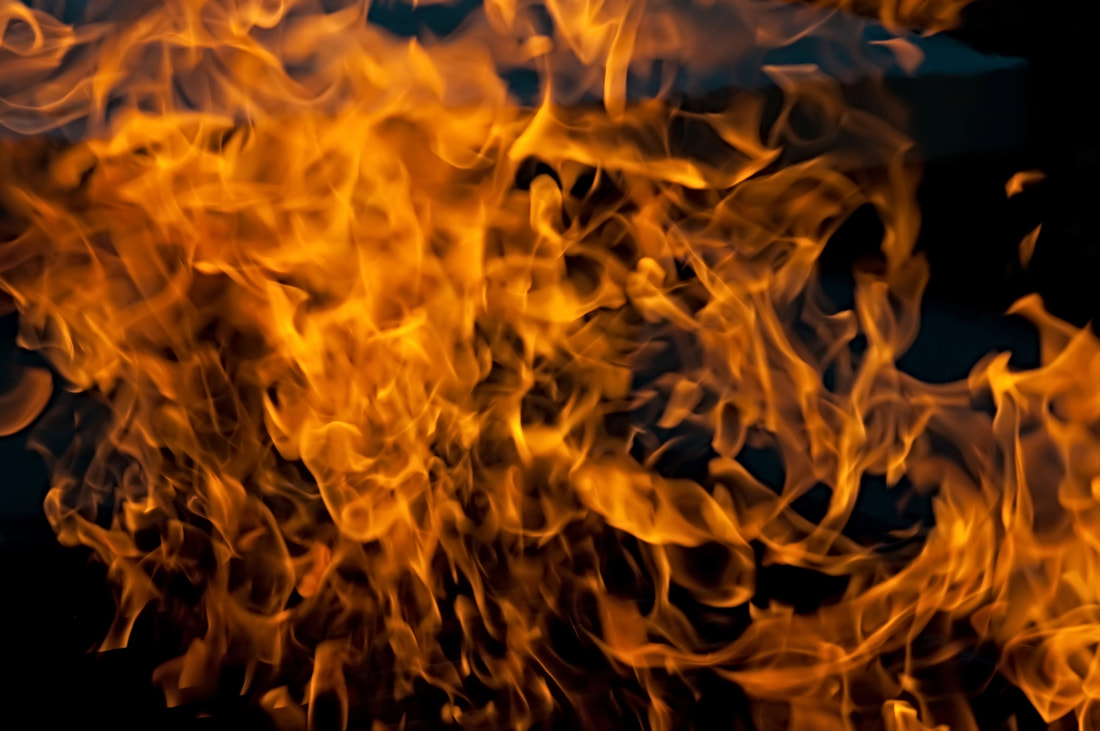Today in church the passage on Moses's inability to see God was brought up again, and a strange thought came to my mind. It struck me that not only did Moses and Jacob see God face to face, and arguably a few others, like Isaiah - but the New Testament tells us that humanity has now seen God face to face in Jesus. Jesus is the perfect representation and image of God (Col. 1:15 and Heb. 1:3), and Jesus told us that when we see him, we have seen the Father (Jn. 14:9). So humanity has seen God face to face, and we continue to see God in the life and teachings of Jesus.
Many have seen God, yet we all have lived.
In this way, God is an all consuming fire. When we saw His face and heard His Word, we had no choice but to kill Him. When His Word to us was to love enemies, many burned in hatred against Him, hate's flames licking up in direct defiance of God's true image. At the same time, others burned in hatred against God, as hate's embers smoldered in indifference to His command, ignoring the Word and making it metaphor in order that it should become practically meaningless. But whether a raging fire of flame or a smoldering fire of embers, our God showed himself to be a consuming fire in the souls of humanity. One could not see Him face to face and continue living, for life apart from God was shown to be a vacuous farce. One, upon seeing God, would either destroy Him in hatred, and thus destroy themselves, or they would see Him and become new creations, whose dross was burned and sifted away as the old died and became new. In either case, what went into the flames would be consumed, and what would come out of the flames would not be the same substance. One product would be a tortured soul reduced to ashen vacuity, and the other a youthful phoenix risen from the ashes of the old. Either way, seeing God face to face meant a death - death for humanity, and death for God Himself.
George MacDonald, in his great work, "The Consuming Fire," gives us a wonderful glimpse into this God who is a consuming fire. MacDonald says,
"[The Saint] sees farther into the meaning of the fire [than the sinner], and knows better what it will do to him. It is a symbol which needed not to be superseded, only unfolded. While men take part with their sins, while they feel as if, separated from their sins, they would be no longer themselves, how can they understand that the lightning word is a Saviour--that word which pierces to the dividing between the man and the evil, which will slay the sin and give life to the sinner? Can it be any comfort to them to be told that God loves them so that he will burn them clean. Can the cleansing of the fire appear to them anything beyond what it must always, more or less, be--a process of torture? They do not want to be clean, and they cannot bear to be tortured. Can they then do other, or can we desire that they should do other, than fear God, even with the fear of the wicked, until they learn to love him with the love of the holy. To them Mount Sinai is crowned with the signs of vengeance. And is not God ready to do unto them even as they fear, though with another feeling and a different end from any which they are capable of supposing? He is against sin: in so far as, and while, they and sin are one, he is against them--against their desires, their aims, their fears, and their hopes; and thus he is altogether and always for them. That thunder and lightning and tempest, that blackness torn with the sound of a trumpet, that visible horror billowed with the voice of words, was all but a faint image to the senses of the slaves of what God thinks and feels against vileness and selfishness, of the unrest of unassuageable repulsion with which he regards such conditions; that so the stupid people, fearing somewhat to do as they would, might leave a little room for that grace to grow in them, which would at length make them see that evil, and not fire, is the fearful thing; yea, so transform them that they would gladly rush up into the trumpet-blast of Sinai to escape the flutes around the golden calf. Could they have understood this, they would have needed no Mount Sinai."
The question that we must all ask ourselves, then, is not whether we have seen God face to face, for all of us have seen Him in seeing Jesus. The question we must ask is, "in what manner have we died upon seeing Him?" For all of us, upon seeing God, have indeed died, and continue to do so. Some of us have died, and are still dying in the flames and embers of our rebellion against God, being gradually reduced to the nothingness that is a life apart from all creation and being. Others have seen God and are dying to self, being daily purified by the transformative flames of the all consuming fire unto true and eternal life.




 RSS Feed
RSS Feed